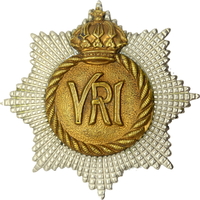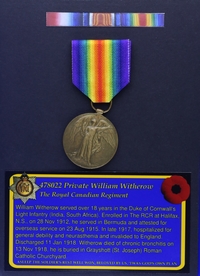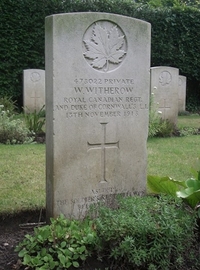
478022 Private William Witherow
Duke of Cornwall's Light Infantry
The Royal Canadian Regiment
By: Capt (ret'd) Michael M. O'Leary, CD, The RCR
William Witherow was born in Tipperary, Ireland, on 23 Nov 1879 (or 1877). He served with the British Army in the 1st Battalion, Duke of Cornwall's Light Infantry for 18 years 206 days. In the UK 1911 census, he is shown as a single, 32-year-old bugler with his regiment.
According to the now defunct website regiments.org, the stations of the 1st Battalion, The Duke of Cornwall's Light Infantry, during Witherow's period of service were as follows:
- 1891; Burma
- 1893; India
- 1897 Lucknow
- Jun 1897; Tirah
- Apr 1898; Lucknow
- 1900 Ceylon, guarding South African prisoners
- 1902; South Africa
- 1906; England: Tidworth
- 1907; Woolwich
- 1909; Gravesend
- 1911; Tidworth
Emigrating to Canada after his discharge from the British Army, Witherow enlisted in the Canadian Permanent Force with The Royal Canadian Regiment at Halifax, on 28 Nov 1912. At 34 years of age, he gave his trade as labourer. His Permanent Force regimental number was 9664.
On 11 Sep 1914, The Royal Canadian Regiment sailed for Bermuda where they would serve for a year on garrison duty. The Regiment relieved the 2nd Battalion, Lincolnshire Regiment, which sailed immediately for England.
Witherow was admitted to hospital at Prospect Bermuda on 1 Jan 1915 for neuritis. His case notes read: "Both legs, calf muscles, pain, etc., some loss of sensation and delayed sensation." Witherow would spend 20 days in hospital and be discharged on 20 Jan 1915.
On 12 Aug 1915, The RCR was relieved in turn by the arrival of the 38th Overseas Battalion from Canada. The RCR returned to Halifax for a stay of only a week. During this time, the Regiment was re-attested for overseas service. Although The RCR had just spent a year in Bermuda, there were concerns regarding the applicability of the soldiers' Permanent Force enlistments for wartime deployments. This was, perhaps, prompted by the idea that a man on a P.F. three-year engagement could choose not to re-engage and the Government would be obligated to bring him home. Enlistment in the Canadian Expeditionary Force (C.E.F.), on the other hand, was for the "Duration of War." Accordingly, the soldiers of The RCR were re-attested, signing C.E.F. attestation papers in August 1915 before sailing for Europe.
While the Regiment was at Halifax, Witherow attested for overseas service in the C.E.F. with The RCR on 23 Aug 1915. He was described on his attestation form as 35 years of age, 5 feet 7 1/2 inches in height, weighing 131 pounds, with a 38-inch chest, a fair complexion, hazel eyes and brown hair. As a "slight defect but not sufficient to cause rejection," his medical examination noted that his left index finger was amputated at the second joint. Witherow named his father, Stephen Witherow, of 13 Havelock Rd., South Wimbledon, England, as his next of kin. His religious denomination was Roman Catholic.
The RCR sailed from Halifax aboard the S.S. Caledonian on 26 Aug 1915, the same ship that had brought them home from Bermuda. Disembarking at Plymouth, England, on 6 Sep 1915, the Regiment went to Shorncliffe for training.
During the Regiment's training in England before going on to France, Witherow would find himself on the wrong side of the military's justice system. On 24 Sep 1915, he was sentenced to 168 hours (One week) of detention, having been found guilty of drunkenness on the line of march.
On 28 Sep 1915, Witherow would receive a new C.E.F. service number to replace the regimental number he received on enlisting. While serving in the C.E.F., his service number would be 478022. Since the Regiment received its C.E.F. numbers while at full strength and not as they were recruited, it had the interesting effect that the soldiers of the Regiment at the time were renumbered in alphabetical order.
The RCR crossed the English Channel on 1 Nov 1915, entering the theatre of war at Boulogne, France. During November and December of 1915 the Regiment prepared for service in the trenches, with companies rotating in the lines for training and a period of providing working parties before entering the line as a battalion at the end of December. The first months of 1916 saw the Regiment in the steady rotation through front line trenches, support trenches, and reserve positions that was the fundamental experience of the infantry in the Great War.
Starting in January, 1916, Witherow commenced a monthly pay assignment to his mother of $20. This was approximately two thirds of his $1.00 per day monthly pay.
After a year of front line service, on 27 Dec 1916, Witherow was granted 10 days leave. He returned from leave on 11 Jan 1917. It would be be almost another year without specific incidents recorded in his service record. Then, on 31 Oct 1917, he reported sick to the unit Medical Officer. The following day, on 1 Nov 1917, Witherow was admitted to No. 12 Canadian Field Ambulance (C.F.A.) with a diagnosis of general debility.
At 12 C.F.A., Witherow's diagnosis was amended to include "neurasthenia." Two days later, on 3 Nov 1917, he was transferred to No. 15 Casualty Clearing Station (C.C.S.) with "debility, general." Witherow continued his rearward movement in the medical evacuation system a few days later. On 8 Nov 1917, he was admitted to No. 22 General Hospital at Camiers where his diagnosis of "neurasthenia" was again recorded.
Witherow was transferred to England and admitted to Connaught Hospital at Aldershot on 21 Nov 1917. Concurrent with his move across the Channel to England, Witherow struck off the strength of the Regiment and posted to the Nova Scotia Regimental Depot (N.S.R.D.). The N.S.R.D. was part of the new regionally based reinforcement system, with named Depots taking in troops from battalions raised in those areas in Canada and providing reinforcement drafts to similarly designated fighting units. The RCR, having been headquartered in Halifax in the decade before the War, was associated with the N.S.R.D. These Depots also became the parent unit for any soldiers returned to England from their affiliated battalions in France and Flanders.
Witherow was admitted to Connaught Hospital at Aldershot on 21 Nov 1917. Diagnosed with "Debility," he was treated for 23 days before being transferred to the Canadian Convalescent Hospital, Bear Wood, Wokingham on 13 Dec 1917. At Bear Wood he was noted as "General Condition Good, No Disability, category Di." Category "D" was for men who would be fit for Category A after completion of remedial training.
Discharged from hospital on 22 Jan 1918, Witherow was sent On Command (a temporary duty assignment without change of parent unit) to the 2nd Canadian Convalescent Depot (2nd C.C.D.). While he was with the 2nd C.C.D., he went before a Medical Board at Bramshott on 29 Mar 1918.
The proceedings of the Medical Board conducted at Bramshott show Witherow as 43 years of age and suffering from debility. His present condition is described as "Complains of dizziness, pains in legs and thighs, unable to walk more than 1 mile and then suffers from legs. Feet slightly flat and least ? Cause of disability as they are very rigid and not at all troublesome. Heart sounds good." The Board recommended a category of "Bii, not likely to be raised in six months." Men in Category Bii were considered fit for employment at base units of the medical service, garrison, or regimental outdoor duties (but not general service at the front).
Witherow completed a Form of Will on 5 Apr 1918. In this will he left all of his estate to his mother. Once Witherow's pay account was settled, there was a balance of $49.37 to go to his mother.
Witherow's medical category of "Bii" was confirmed on 1 May 1918. By the end of that month, on 27 May 1918, he ceased to be attached to the 2nd C.C.D. on return to N.S.R.D., Bramshott, where he was posted to the Depot Company. But Witherow's medical problems were not over for the time being, and whether it was something he picked up in France or in the hospitals, on 31 May 1918, he was sent On Command to the Segregation Camp at Frensham Ponds, Bramshott.
The Segregation Camp was a measure to control the potential risks of spreading infectious diseases, in particular Influenza, between the camps in England, or with those in France. It was also used as a receiving camp for fresh troops coming from Canada before they were introduced into the main populations of soldiers in the training camps. Normally, troops in transit spent four weeks in the Segregation Camp, Witherow would still be there in November 1918.
On 11 Nov 1918, Witherow was admitted to No. 12 Canadian General Hospital suffering from bronchitis. His case notes recorded:
"Complaints: shortness of breath, cough, pain in limbs, pains over heart and dizziness.
"Present Illness: Day before yesterday (9/11/18) man became short of breath, was unable to walk any distance without having to stop and rest. A dry cough without any expectoration developed with pains over the chest anteriorly and posteriorly, aggravated on coughing. Symptoms did not abate and patient was admitted to hospital 11/11/18.
"Personal History: Born in Ireland, lived in India five years, South Africa 2 1/2 years, Canada 2 years. Single, had measles, malaria, enteric, and dysentery in India. Uses alcohol and tobacco.
"Military History: Served in Regular Army in India, South Africa and Bermuda. Came to England from Bermuda August 1915, France Nov 1915, returned to England Nov 1917. Was in hospital at Aldershot with complaints similar to those which he has at present, for three weeks, transferred to Bear Wood Convalescent home, remained six weeks.
"Present Condition: T. 00, P. 100, R. 32; assumes dorsal decubitis, appears to be suffering no pain, has vomited several times within last hour, face burned, eyes bright, marked shortness of breath. General nutrition fair."
A detailed assessment of respiratory, circulatory, genito-urinary, locomotor and Inaguinetary, and digestive systems followed.
The final summary of Witherow's case is succinct and tragic; "Admitted with this diagnosis, dyspnoea cardiac enlarged heart, diminished urine and vomiting. Died suddenly before urinalysis could be obtained."
William Witherow died suddenly at 9.30 p.m. on 13 Nov 1918 at the Military Hospital, Bramshott. The cause of death noted in his pay record was: "Valvular Disease of the Heart and Chronic Bronchitis." His final status recorded by the Regimental Depot was to note that he ceased to be on command to Frensham Ponds and was struck off strength, having died in hospital.
For his service in the C.E.F., Witherow was entitled to receive the 1914-15 Star, the British War Medal, and the Victory Medal. The medal card in his service record identifies his mother, Mrs Kate Witherow, as the recipient for medals and decorations. She would also receive the silver Memorial Cross. Witherow's father, as the named next-of-kin, would receive the Memorial Plaque and scroll sent to the families of fallen soldiers. All of these items were sent to the family in 1921 and 1922.
Pro Patria
Visit a randomly selected page in The O'Leary Collection (or reload for another choice):
- The O'Leary Collection; Medals of The Royal Canadian Regiment.
- Researching Canadian Soldiers of the First World War
- Researching The Royal Canadian Regiment
- The RCR in the First World War
- Badges of The RCR
- The Senior Subaltern
- The Minute Book (blog)
- Rogue Papers
- Tactical Primers
- The Regimental Library
- Battle Honours
- Perpetuation of the CEF
- A Miscellany
- Quotes
- The Frontenac Times
- Site Map
QUICK LINKS
The O'Leary Collection—Medals of The Royal Canadian Regiment
Newest additions:
![]()
![]() SB-12725 Private Henry "Hank" Ard
SB-12725 Private Henry "Hank" Ard ![]()
WIA at Hill 187, Died of Wounds in Japan
![]()
![]() 2355331 Lance Corporal Albert Lorking
2355331 Lance Corporal Albert Lorking
Wounded in action, later a War Amps representative.
![]()
![]() 4334 / 477996 Pte Isaac Hamilton Wilcox
4334 / 477996 Pte Isaac Hamilton Wilcox
Permanent Force, South Africa, and C.E.F.
![]()
![]() 477019 Private Harold Ashcroft
477019 Private Harold Ashcroft
Transferred to the Tunnelers.
![]()
![]() 734231 Private Clark D. Thompson
734231 Private Clark D. Thompson ![]()
The older Thompson brother, killed in action.
![]()
![]() 733849 Private Norman Parker Thompson
733849 Private Norman Parker Thompson
The younger Thompson brother; post-war service in the Special Guard.
![]()
![]()
![]() A305 / 400305 Private Andrew Walker
A305 / 400305 Private Andrew Walker ![]()
"Previously reported Wounded, now Killed in Action."
![]()
![]() 823298 Pte Thomas Patrick Steele, M.M.
823298 Pte Thomas Patrick Steele, M.M. ![]()
… for gallant conduct in the field …
![]()
![]() P13066 Sergeant Harold Thompson
P13066 Sergeant Harold Thompson
Instrumental Soloist for over 20 years of Canadian Army service.
![]()
![]() 9609 / 477728 Private Albert Edward Piper
9609 / 477728 Private Albert Edward Piper
"Arrived from England as a STOWAWAY …"




